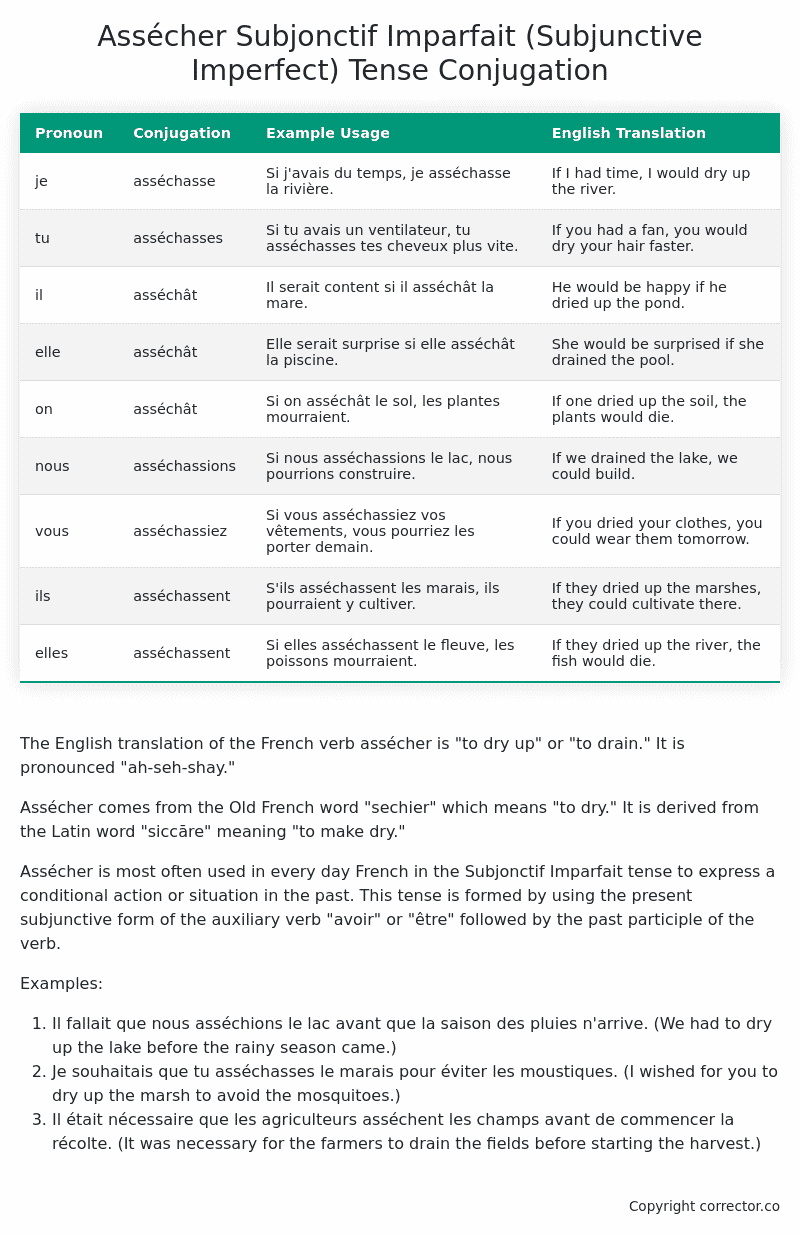Subjonctif Imparfait (Subjunctive Imperfect) Tense Conjugation of the French Verb assécher
Introduction to the verb assécher
The English translation of the French verb assécher is “to dry up” or “to drain.” It is pronounced “ah-seh-shay.”
Assécher comes from the Old French word “sechier” which means “to dry.” It is derived from the Latin word “siccāre” meaning “to make dry.”
Assécher is most often used in every day French in the Subjonctif Imparfait tense to express a conditional action or situation in the past. This tense is formed by using the present subjunctive form of the auxiliary verb “avoir” or “être” followed by the past participle of the verb.
Examples:
- Il fallait que nous asséchions le lac avant que la saison des pluies n’arrive. (We had to dry up the lake before the rainy season came.)
- Je souhaitais que tu asséchasses le marais pour éviter les moustiques. (I wished for you to dry up the marsh to avoid the mosquitoes.)
- Il était nécessaire que les agriculteurs asséchent les champs avant de commencer la récolte. (It was necessary for the farmers to drain the fields before starting the harvest.)
Table of the Subjonctif Imparfait (Subjunctive Imperfect) Tense Conjugation of assécher
| Pronoun | Conjugation | Example Usage | English Translation |
|---|---|---|---|
| je | asséchasse | Si j’avais du temps, je asséchasse la rivière. | If I had time, I would dry up the river. |
| tu | asséchasses | Si tu avais un ventilateur, tu asséchasses tes cheveux plus vite. | If you had a fan, you would dry your hair faster. |
| il | asséchât | Il serait content si il asséchât la mare. | He would be happy if he dried up the pond. |
| elle | asséchât | Elle serait surprise si elle asséchât la piscine. | She would be surprised if she drained the pool. |
| on | asséchât | Si on asséchât le sol, les plantes mourraient. | If one dried up the soil, the plants would die. |
| nous | asséchassions | Si nous asséchassions le lac, nous pourrions construire. | If we drained the lake, we could build. |
| vous | asséchassiez | Si vous asséchassiez vos vêtements, vous pourriez les porter demain. | If you dried your clothes, you could wear them tomorrow. |
| ils | asséchassent | S’ils asséchassent les marais, ils pourraient y cultiver. | If they dried up the marshes, they could cultivate there. |
| elles | asséchassent | Si elles asséchassent le fleuve, les poissons mourraient. | If they dried up the river, the fish would die. |
Other Conjugations for Assécher.
Le Present (Present Tense) Conjugation of the French Verb assécher
Imparfait (Imperfect) Tense Conjugation of the French Verb assécher
Passé Simple (Simple Past) Tense Conjugation of the French Verb assécher
Passé Composé (Present Perfect) Tense Conjugation of the French Verb assécher
Futur Simple (Simple Future) Tense Conjugation of the French Verb assécher
Futur Proche (Near Future) Tense Conjugation of the French Verb assécher
Plus-que-parfait (Pluperfect) Tense Conjugation of the French Verb assécher
Passé Antérieur (Past Anterior) Tense Conjugation of the French Verb assécher
Futur Antérieur (Future Anterior) Tense Conjugation of the French Verb assécher
Subjonctif Présent (Subjunctive Present) Tense Conjugation of the French Verb assécher
Subjonctif Passé (Subjunctive Past) Tense Conjugation of the French Verb assécher
Subjonctif Imparfait (Subjunctive Imperfect) Tense Conjugation of the French Verb assécher (this article)
Subjonctif Plus-que-parfait (Subjunctive Pluperfect) Tense Conjugation of the French Verb assécher
Conditionnel Présent (Conditional Present) Tense Conjugation of the French Verb assécher
Conditionnel Passé (Conditional Past) Tense Conjugation of the French Verb assécher
L’impératif Présent (Imperative Present) Tense Conjugation of the French Verb assécher
L’infinitif Présent (Infinitive Present) Tense Conjugation of the French Verb assécher
Struggling with French verbs or the language in general? Why not use our free French Grammar Checker – no registration required!
Get a FREE Download Study Sheet of this Conjugation 🔥
Simply right click the image below, click “save image” and get your free reference for the assécher Subjonctif Imparfait tense conjugation!

Assécher – About the French Subjonctif Imparfait (Subjunctive Imperfect) Tense
Formation
Common Everyday Usage Patterns
Interactions with Other Tenses
Subjonctif Présent
Indicatif Passé Composé
Conditional
Conditional Perfect
Summary
I hope you enjoyed this article on the verb assécher. Still in a learning mood? Check out another TOTALLY random French verb conjugation!


